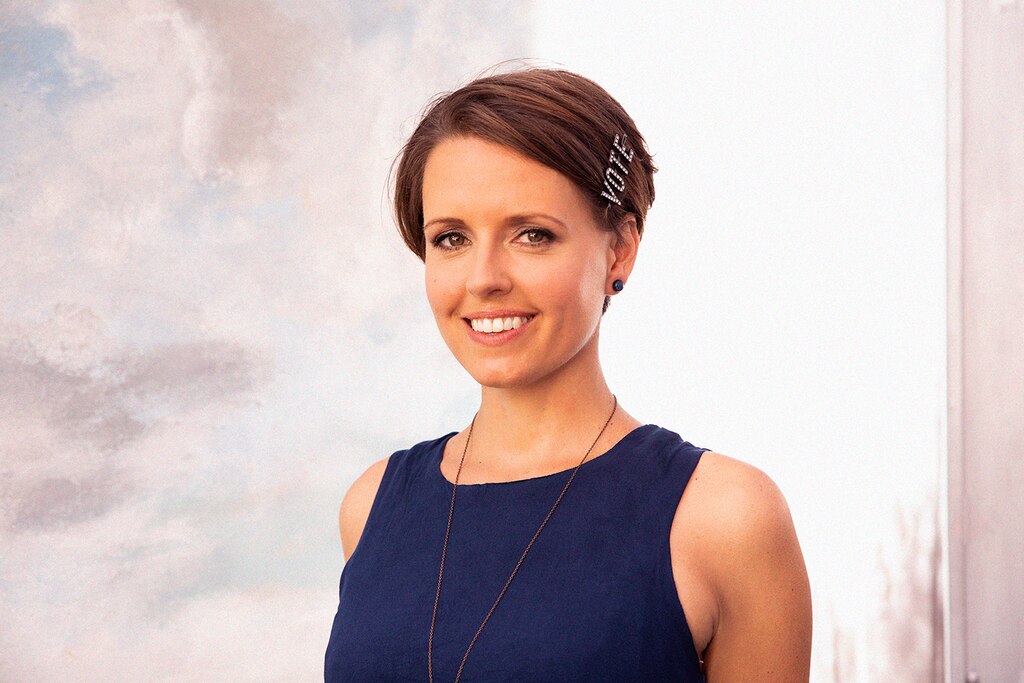Emily White, 40, thinks free concerts can give young people the incentive to vote.
She launched #iVoted in 2017 to produce concerts on election nights and during early voting that allow entry to fans who show a selfie from outside their polling place or at home with a blank and unmarked ballot. (Showing a filled-out ballot is illegal).
White, a longtime music industry executive, started #iVoted after noticing 2016 U.S. Election results that were determined by vote counts that were the size of concert venues.
She uses data to book concerts where there is potential to reach a significant number of unregistered voters.
The Baltimore Banner thanks its sponsors. Become one.
In 2018, #iVoted partnered with 157 venues in 37 states. That year, they threw a concert featuring HAKEN and Leprous at Baltimore Soundstage. In 2020, White’s company produced the largest digital concert ever with 400 artists, including Billie Eilish and Trey Anastasio from Phish performing before 50,000 fans watching from screens. This year, #iVoted will offer eight concerts throughout the country on election night with an additional six in the week leading up to Nov. 5 — though none in Maryland.
The nonprofit works with an array of partners and in conjunction with Johns Hopkins University’s SNF Agora Institute, where White is a visiting fellow.
Some of the shows are funded by Drive Agency. Others are funded by NextGen America’s 501(c)3. Other funding is by private foundations and donors supporting nonpartisan voter turnout work.
#iVoted books talent based on the top trending artists by location and determines which artists have the largest civic impact. That doesn’t necessarily mean top-selling artists like Beyoncé or Taylor Swift will be the ones to get out the vote in certain cities, White said.
Amy Becker, a professor of communication and media at Loyola University Maryland, thinks that mixing music, politics and social media are all great ideas to reach young voters — particularly young people of color.
The Baltimore Banner thanks its sponsors. Become one.
“It’s where you reach people. It’s a good strategic pull,” Becker said, adding that endorsements help, but young people have more individualized music preferences.
It’s a new twist on old strategy.
Music has long intersected with politics. Billie Holiday’s “Strange Fruit” raised awareness about lynchings in the South during the Civil Rights Movement and Bob Dylan performed anti-Vietnam War songs “Masters of War” and “Blowin’ in the Wind” in the 1960s. This election, celebrity support has come from the likes of Kid Rock and Jason Aldean for Donald Trump to Beyoncé and Swift for Harris.
Becker has also been considering how young people use music to express political preferences on social media platforms like TikTok.
“Young people believe that music is personalized and a form of personal expression,” she added.
The Baltimore Banner thanks its sponsors. Become one.
#iVoted recently began using datasets from the SNF Agora Institute and “now knows which of the top trending artists will increase voter turnout the most,” White said.
For example, earlier this month, 44.97% of attendees at an #iVoted concert with Skilla Baby and Tee Grizzley in Philadelphia were ages 18 to 24, and 41.95% were 25 to 34.

#iVoted is a good way to reach younger and new voters, which is important in this country where “extraordinary burdens” are placed upon voters, said Sam Novey, chief strategist at the University of Maryland Center for Democracy and Civic Engagement. He also sits on the board of #iVoted.
“It’s a steep learning curve for new voters,” he said, adding that #iVote will help embed voting appreciation and habits in young voters, helping them overcome that learning curve.
Hooking them through musicians is also an effective way, Novey said. People are more likely to vote when they see people in their lives — including people they follow on social media, or celebrities they admire — also vote, Novey said.
The Baltimore Banner thanks its sponsors. Become one.

Candidates know this and try to win over celebrities. In September, Harris received the official endorsement of Swift, who signed her Instagram post of support with “Childless Cat Lady” — an acknowledgement of a comment by Trump’s running mate J.D. Vance, who used the term to describe prominent Democrats, including Harris, who has two stepchildren.
The Harris-Walz campaign has since also racked up huge musical support from Ariana Grande (376 million Instagram followers), Jennifer Lopez (250 million Instagram followers), Bad Bunny (45.6 million Instagram followers), Eminem (45.2 million Instagram followers), Ricky Martin (18.6 million Instagram followers), Marc Anthony (13.5 million Instagram followers), Maná (2.3 million Instagram followers) and Los Tigres del Norte (1.8 million Instagram followers).
But the biggest names might not always translate to success when registering new younger voters, White warned.
“In Atlanta, Taylor Swift has the most listeners, but Drake and 21 Savage bring out more voters because her voters are already registered to vote,” White said. “Canadian Drake can actually save our democracy.”
This story has been updated to correct Sam Novey's first name.





Comments
Welcome to The Banner's subscriber-only commenting community. Please review our community guidelines.